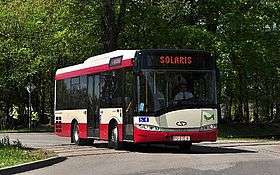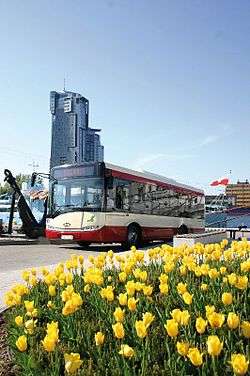Solaris Alpino 8,9 LE
| Solaris Alpino 8,9 LE | |
|---|---|
 | |
| Overview | |
| Manufacturer | Solaris Bus & Coach |
| Production | 2008- |
| Assembly | Bolechowo, Poland |
| Body and chassis | |
| Class | Single-deck city-bus |
| Doors | 2 |
| Floor type | Low entry |
| Powertrain | |
| Engine |
1) Cummins ISBe4 250B Euro 4 2) Cummins ISB6.7E5 250B Euro 5 3) Cummins ISB6.7E5 285B Euro 5 |
| Capacity | 60 |
| Power output |
1) 183 kW (250 KM) 2) 180,5 kW (245 KM) 3) 209 kW (284 KM) |
| Transmission |
Voith Diwa 854.5 (automatic) ZF 6HP-504 (automatic) |
| Dimensions | |
| Length | 8950 mm |
| Width | 2400 mm |
| Height |
2850 mm 3035 mm (with air conditioning) |
| Curb weight | 16000 kg |
Solaris Alpino 8,9 LE is a low-entry bus built as a variation of the Solaris Alpino, developed for city transportation, manufactured from 2008 by Solaris Bus & Coach in Bolechowo near Poznań in Poland.[1]
History
The Solaris Alpino 8.9 LE was put into production since the spring of 2008. It was created primarily for Alpine and Nordic countries. The first customer, who contributed to the creation of the model, placed an order for three types of the low-entry bus, to a company in Austria. The first information about it appeared during the AUTOTEC Trade Fair in Brno in June 2008, after the delivery of the buses to Austria. Officially debuted during the IAA Nutzfahrzeuge Trade Fair in 2008 in Hannover, which was held from September 25 - October 2, 2008, while in Poland it was shown at the Transexpo Trade Fair in Kielce in October 2008.[2]

The Solaris Alpino 8.9 LE is extended by more than 30 cm from the low-floor variant Solaris Alpino. It has a longer wheelbase and longer rear overhang, which resulted in an increase in weight. Just like the base model it is structurally related to the third generation Solaris Urbino buses. It is equipped with Cummins ISBe4 250B engine (with a capacity of 6.7 dm3 and 250 HP in power) centrally mounted at the back and a Voith Diwa 854.5 automatic gearbox. Optionally the bus can be mounted with a 6-speed automatic ZF 6HP-504 gearbox. This engine meets the standard Euro 4 using SCR technology, which requires AdBlue. The front suspension can be installed independently or alternatively with the IFS Voith ZF RL 75 EC. At the rear, it has a standard RS ArvinMeritor axle 24 on double tires. The width was reduced by 15 cm when compared with the Solaris Urbino series, and the desire to preserve adequate headroom in the rear of the bus without unduly increasing the height of the whole bus resulted in the need for the rear tires to have a reduced size. To ensure a broad aisle, on the one side of the bus instead of double seats there are 1 + 1/2 type seats on the rear axle.[3] The cab is fitted as standard with a dashboard designed by Solaris, there is an optional dashboard by Siemens VDO or Multibus Actia.[4]
Initially, the Solaris Alpino 8.9 LE had the Euro 4 engine as standard. At present, the ISBe5 Cummins engine or Cummins ISB6.7E5 250B or ISB6.7E5 285B can be used which meets Euro 5 (which is the same type, but with an additional filter) or EEV. The bus can also be fitted a CNG-powered engine. To reduce the rear axle load fuel tank with a capacity of 165 dm3 was placed behind the front door, and the AdBlue tank with a capacity of 40 dm3 was placed between the front wheel arches and the middle door. By using these solutions such as the central lubrication system and the self-diagnostic KFBS1 Kogel and the maintenance-free bearings in the drive and steering, this has reduced servicing time and cost. In 2011, the company debuted the first prototype Solaris Urbino electric LE 8.9 electric bus, which was created by a significant redesign of the Solaris Alpino 8.9 LE.[5]
References
- ↑ "Home". Solaris. Retrieved 8 December 2014.
- ↑ "Solaris Alpino on the official page of the producers". Solaris. Retrieved 8 December 2014.
- ↑ "1.008 Solaris Alpino 8,9 LE". IMCDB. Retrieved 8 December 2014.
- ↑ "Solaris Alpino 8,9 LE - information: Solaris Alpino 8,9 LE is a very good car, that was released by "Solaris" company.". Mycazr. Retrieved 8 December 2014.
- ↑ "Photograph and specification of the bus". Phototrans. Retrieved 8 December 2014.